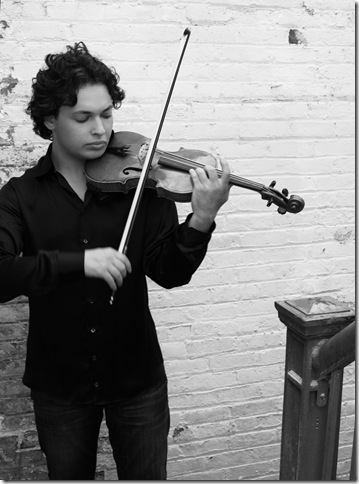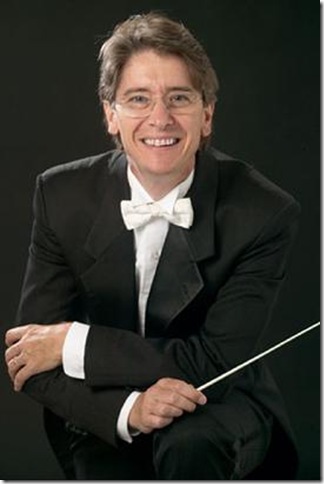The young Russian-American violinist Yevgeny Kutik was the able soloist Feb. 9 in a concert by The Symphonia Boca Raton, under the guest baton of West Virginia Symphony Orchestra director Grant Cooper.
Kutik was the soloist in a work violinists know better than audiences do: the Concerto No. 22 (in A minor) of the Italian violinist and opera conductor Giovanni Battista Viotti (1755-1824). Mozart was born the following year, so Viotti was part of that period of late Classicism that flowered into early Romanticism with the advent of Beethoven. As a busy touring violinist in the time when soloists were expected to provide their own material, Viotti composed 29 violin concertos; conservative music, but expertly designed to show off the violin, and with a strong melodic profile.
The 22nd concerto, written in 1792, is the best-known of his concerti, perhaps because its melodies are a shade better than the others. Its opening movement is something of a slow fast movement, with a leisurely tempo, short-winded energy and a lack of big drama. Kutik has a large, rich sound, and his technique is accurate and impressive. His sound is somewhat too demonstrative for this concerto; it seems naturally big, and this is the kind of piece that does well with violinists with a much narrower style.
In the second movement, he approached with music with an admirable nobility of tone, getting the most out of Viotti’s writing, which has a Gluckian plainness with delicate ornamentation. It’s fairly static music, though, which is why the lively third movement tends to be the audience favorite. Kutik played with vigor and thoroughly drilled virtuosity, and brought the concerto off well, and to significant applause.
The orchestra sounded somewhat soft and disengaged, and there was some out-of-tune playing here and there in the finale. But there isn’t a lot to work with orchestrally in this piece, and the Symphonia accompanied Kutik by staying in the background, allowing the music to speak the best it could. Overall, though, the Viotti is a dull work, and it would have been good to hear Kutik in a piece with more musical interest, perhaps one of the Paganini or Spohr concerti rather than this one if he wanted to stay in this period and do something off the beaten path.
Cooper, a native of New Zealand who has led the West Virginia Symphony (based in the state capital of Charleston) since 2001, opened the concert with Maurice Ravel’s Le Tombeau de Couperin. The colors and textures of Ravel’s orchestration suits the size of this orchestra well; he was cognizant of every instrumental shade, so a smaller ensemble doesn’t hurt the effect, and in some cases actually improves it.
Indeed, the Symphonia sounded in this piece very much like the chamber orchestra it is, and Cooper brought out a surpassingly light and gentle performance from the musicians. The opening Prelude and the Forlane that followed were played with great delicacy and restraint, and with considerable loveliness. The solo oboe in the Minuet was excellent, and the hushed closing bars were well-judged. In the closing Rigaudon, even though there wasn’t an emphasis on crispness of rhythm, the music nevertheless had great forward drive, and it ended the piece nicely.
The Fourth Symphony of Beethoven (in B-flat, Op. 60), which occupied the second half of the concert at the Roberts Theater, is a frequent choice of good smaller orchestras because of the relatively modest forces it requires, and it was a wise choice for the Symphonia. Cooper led a muscular reading of this great work, but stayed within the orchestra’s limits, not attempting to overemphasize anything, but let the music’s inherent strength speak for itself.
And so you had a first movement that moved along swiftly and cleanly, without titanic shocks, and a slow movement that followed the lyrical line and its argument without focusing too intently on the heartbeat motif that runs through it. The third movement was pleasingly vigorous, and the finale hurried along at a very fast clip. It was a very good, solid reading of the Fourth, and it showed audiences who may not have been aware that the Symphonia’s musicians are veteran professionals who know this music inside out.
Cooper proved to be a fine conductor, and his choices were well thought-out amid consistent interpretive arcs. It was good to have him here, and I’m sure audiences and orchestra would welcome him back.
Former Florida Philharmonic conductor James Judd guests next with The Symphonia at 3 p.m. Sunday, March 16, at the Roberts Theater on the campus of St. Andrew’s School in western Boca Raton. Violinist Elmar Oliveira joins the group for the Beethoven Violin Concerto on a program with the Surprise Symphony (No. 94 in G) of Haydn and Samuel Barber’s Serenade for Strings. Tickets range from $42-$71. Call 1-866-MUSIC-01 (1-866-687-4201) or 561-376-3848, or visit bocasymphonia.org.

